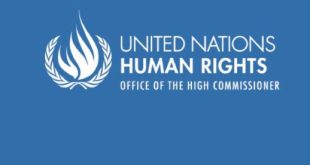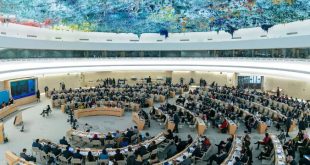When the United Nations set out to draft a politically-sensitive Arms Trade Treaty (ATT), ever since negotiations began in 2006, member states agreed to take the final decision by “consensus”.
That meant a decision approved by all 193 countries, perhaps with “reservations” by some, if they had any lingering doubts about the text of the treaty.
But the concept of consensus, going back to the Law of the Sea Treaty in the 1970s, also meant that every single member state is virtually armed with a powerful veto, long maligned as a prerogative of the five big powers in the Security Council: the United States, UK, France, China and Russia.
So, when three countries – Iran, Syria and North Korea – broke the consensus rule and prevented the adoption of the ATT last week, the veto came back to haunt the Big Five who were outraged by the dissenters since the overwhelming majority of 190 countries was in agreement with the final treaty.
But as one political analyst pointed out, what happened last week is no different from the United States casting a single veto to deprive former Secretary-General Boutros Boutros-Ghali of a second term back in November 1996, even though the remaining 14 countries in the Security Council overwhelmingly voted for him.
The United States, he said, was a great promoter of democracy at the national level, but the worst opponent of democracy at the international level.
Stephen Zunes, professor of politics and chair of Middle Eastern Studies at the University of San Francisco, told IPS, “Given the 75-plus times the U.S. has been the single negative vote in the Security Council, thereby blocking consensus with its veto, the hypocrisy is pretty clear.
“On the bigger question: given that there have been a number of largely successful arms control treaties, human rights treaties, and other international treaties adopted by the U.N. short of consensus, I am frankly perplexed as to why this one has been held up, particularly since the three countries in question are considered by most governments to be rogues in the international community,” said Zunes.
However, there is one disturbing possibility that might be worth investigating, he noted.
“Given that the United States has tried to weaken the treaty and successfully put off a vote awhile back, it begs the question as to whether the U.S. had a role in insisting on consensus so they could both block the treaty but have it blamed on the three rogues,” said Zunes, who has written extensively on the politics of the Security Council and its voting patterns.
With the failure of the conference to approve the treaty last week, the 193-member General Assembly, whose decisions are by majority vote, is expected to adopt the ATT later this week.
The resolution is being co-sponsored by more than 64 countries, including the United States, France and UK, and will be adopted by a simple majority.
Dr. Natalie J. Goldring, a senior fellow with the Security Studies Programme in the Edmund A. Walsh School of Foreign Service at Georgetown University, told IPS the United States has been one of the strongest advocates of consensus in the ATT process.
“It has consistently justified this approach as a way of protecting U.S. interests,” she said.
Even former secretary of state Hillary Clinton’s 2009 statement that the U.S. was reversing the former George W. Bush administration’s position on the proposed treaty included an emphasis on a consensus process.
During the ATT process, consensus has been treated as if it requires unanimity, even though that’s not automatically the case, said Goldring, who also represents the Acronym Institute at the United Nations, on conventional weapons and arms trade issues.
She said treating consensus as effectively requiring unanimity gives veto power to the countries with the most extreme views in any process.
The U.S. delegation insisted on consensus throughout this process, said Goldring, who has been monitoring the ATT talks since they began in 2006.
Ironically, she said, the process was used against U.S. interests by the so-called sceptics, namely Iran, North Korea and Syria, which officially opposed the ATT.
Even if strict consensus is the desired result, the United Nations needs to have ways to move forward when reaching consensus is impossible. Returning issues to the General Assembly is an option that should be included far more consistently than has been the case in the past, she added.
At the conclusion of the ATT talks last week, most countries, including the United States, UK and France, were strongly critical of the three countries that opposed the adoption of the treaty meant to regulate the global trade in conventional weapons.
Referring to the “hypocrisy” of the big powers, Zunes pointed out that neither France nor the UK have used their veto power since 1989 when they joined the U.S. in vetoing two resolutions: against the U.S. invasion of Panama and the U.S. shooting down a Libyan plane.
Over the previous two decades, however, they joined the U.S. on several occasions vetoing resolutions regarding sanctions on South Africa and other resolutions regarding South Africa, Namibia and Rhodesia.
In 1982, the UK joined the U.S. in a veto regarding the Falklands.
And since the Suez crisis in 1956, the only vetoes France or the UK cast without the United States were several by the UK in regard to Rhodesia (now Zimbabwe) between 1963 and 1972, and one 1974 French veto regarding a dispute between the Comoros and France on Mayotte.
Goldring told IPS, “I don’t think the conspiracy theory is relevant. The U.S. delegation said they weren’t planning to block the treaty, and that claim seems credible.”
She also said the U.S. has co-authored the Kenyan resolution to take the ATT to the General Assembly.
“They didn’t have to do this, and it’s consistent with the statement that the U.S. supports the treaty that resulted from these negotiations.”
She also said the current text is an excellent starting point for the ATT. “The real test, however, will be in how the treaty is implemented,” she added. “If weapons suppliers carry out the treaty provisions in good faith, for example, they will forego arms transfers to countries with significant human rights and humanitarian issues.”
Even raising the profile of these concerns in the decision-making process is a significant step forward, she added.
Post Disclaimer | Support Us
Support Us
The sailanmuslim.com web site entirely supported by individual donors and well wishers. If you regularly visit this site and wish to show your appreciation, or if you wish to see further development of sailanmuslim.com, please donate us
IMPORTANT : All content hosted on sailanmuslim.com is solely for non-commercial purposes and with the permission of original copyright holders. Any other use of the hosted content, such as for financial gain, requires express approval from the copyright owners.
 Sri lanka Muslims Web Portal Sri Lanka Muslims News Center
Sri lanka Muslims Web Portal Sri Lanka Muslims News Center

 Donate
Donate


